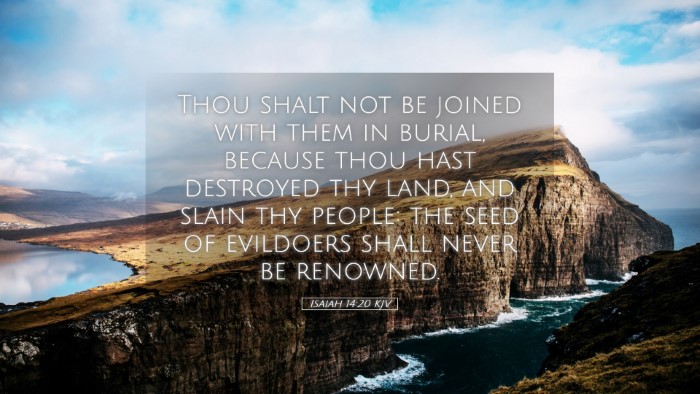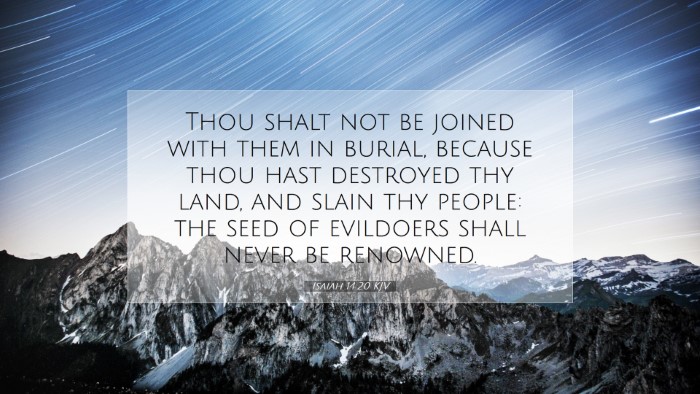Commentary on Isaiah 14:20
Isaiah 14:20 states: "You will not join them in burial, because you have destroyed your land and killed your people. The offspring of the wicked will never be mentioned again." This verse follows a broader context of judgment against Babylon and its king, often interpreted as a warning about pride and the eventual fall of those who oppose God.
Contextual Analysis
This verse appears in a section of Isaiah where the prophet describes the downfall of the Babylonian empire and the fate of its king. The surrounding verses underscore a dichotomy between the proud rise of Babylon and God's ultimate judgment upon it.
Historical Background
- Babylonian Empire: The Babylonian Empire was known for its arrogance and idolatry, epitomized by its ruler's self-exaltation.
- Prophetic Judgments: Isaiah is prophesying a stark reality that despite the empire's might, God's sovereignty will prevail, leading to a complete ruin of its legacy.
Thematic Insights
This verse contributes several themes significant for theological reflection:
- Pride and Destruction: The king of Babylon represents pride that leads to a disregard for justice and righteousness, ultimately culminating in destruction.
- Legacy of the Wicked: The oblivion of the wicked’s descendants serves as a focus on divine justice, signifying that those who act against God will not endure.
Commentary Insights
Various public domain commentaries provide insight into the implications of this verse:
Matthew Henry's Commentary
Matthew Henry emphasizes the definitive nature of God's judgments and the certainty of divine retribution. He notes:
- The phrase “You will not join them in burial” indicates a severe dishonor; the king will not receive a proper death or burial due to his wickedness.
- This rejection is a symbol of being cut off from the benefits of community and familial ties, highlighting severe alienation as a consequence of sin.
Albert Barnes' Notes
In Albert Barnes' commentary, he elucidates:
- The term “destroyed your land” illustrates not just physical devastation but moral and spiritual corruption that Babylon inflicted on its own nation.
- He also underlines the phrase “the offspring of the wicked will never be mentioned again,” asserting that God's judgment will extinguish the legacy of evil.
Adam Clarke's Commentary
Adam Clarke provides a detailed examination of the associated imagery:
- He views the text as a strong denunciation of social and state leaders who misuse power for personal gain, reflecting a broader moral principle that applies universally.
- Clarke also interprets the “burial” not only as a physical act but as a metaphor for recognition and honor, which will be denied to unjust rulers.
Theological Implications
The verse serves as a profound reminder of the nature of divine justice and the consequences of pride:
- Divine Sovereignty: God remains sovereign over nations and rulers. The fall of Babylon and its king illustrates God's ultimate authority and control over human history.
- Righteous Judgment: The judgment emphasizes that those who exploit power, like Babylon, will face dire consequences. This serves as a warning across time to leaders and nations.
Pastoral Reflections
For pastors and ministry leaders, Isaiah 14:20 acts as a poignant reminder of the importance of humility and righteous governance:
- This serves as a call to lead with integrity, uphold justice, and reflect God’s character in leadership.
- The verse reminds believers of the weight of their legacy; faithful living can lead to a legacy that honors God.
Conclusion
Isaiah 14:20 encapsulates significant spiritual truths regarding the nature of power, pride, and ultimate judgment. It serves as a solemn warning to all who might find themselves in positions of authority, urging them to walk humbly before God, lest they end up as mere footnotes in the annals of history, forgotten and forsaken.


